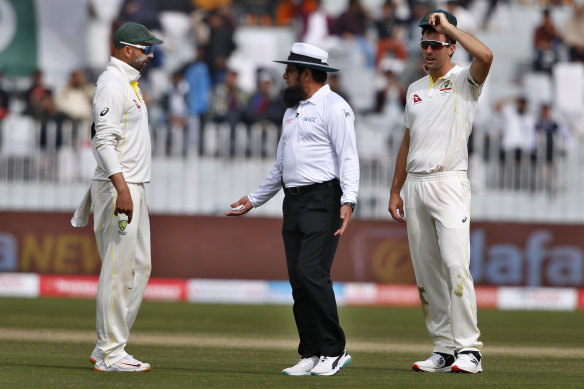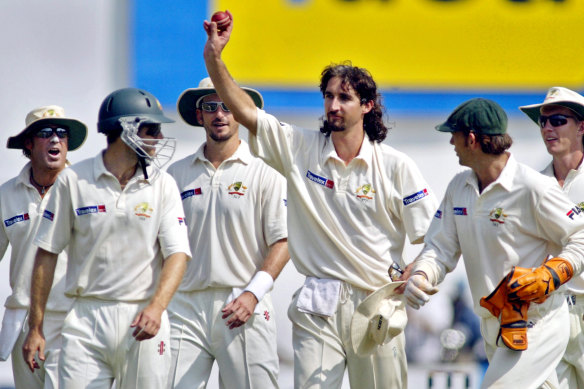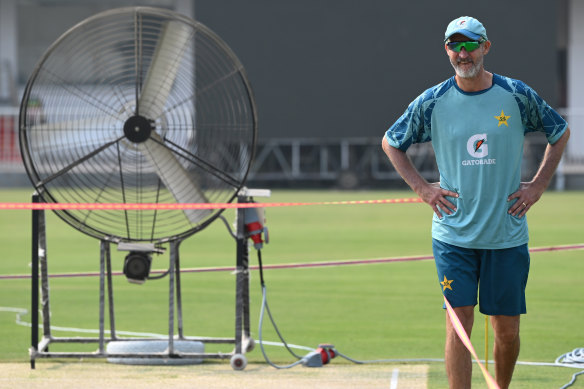In the world of international cricket, coaches and players often share a well-established routine post-match. After leaving the dressing room, they receive their phones from anti-corruption officials and catch up on the outside world during the bus ride home.
However, for Pakistan’s head coach, Jason Gillespie, and his high-performance coach, Tim Nielsen, this routine took a sharp turn after the first Test against England in Multan.
According to the Australin media Gillespie faced a harsh reality when he learned through a Pakistan Cricket Board (PCB) statement circulated on social media that he and captain Shan Masood had been removed from the team selection panel. The surprising twist? A former umpire took their place. This sudden shift was a sobering reminder of how delicate cricket management is in a 250

million-person nation where government interests are closely entwined with PCB operations; it is noteworthy that PCB Chair Mohsin Naqvi also holds the position of Interior Minister.
Shortly after this turmoil, Pakistan pulled off an incredible comeback by defeating England under Ben Stokes on difficult spinning pitches. However, white-ball coach Gary Kirsten decided to resign after encountering a similar shift in role, leading to Gillespie stepping in for the tour of Australia, where he would already be present. Despite agreeing to the change, the ongoing instability in the coaching staff has raised concerns for both Gillespie and Nielsen, who are only six months into a two-year contract.
“We need to adapt to their system,” Nielsen stated. “There’s been a desperate need for success, and winning a Test series in Pakistan for the first time in three and a half years is significant. However, the landscape here is distinctly different from Australia.”
Nielsen emphasized the challenges of transitioning coaching styles, stating, “You can’t simply apply Australian methods to Pakistan. Our aim is to create a comfortable and safe team environment. If any issues arise, we aim to focus on our performance, as there is considerable talent within the squad.”
The unpredictable nature of selection processes and reactions to match outcomes in Pakistan complicates matters further. “It’s vital to maintain a sense of calm within the team despite the external chaos,” he added. “Dizzy’s greatest challenge will be navigating the emotional highs and lows associated with wins and losses throughout this journey.”
As Gillespie and Nielsen navigate this complex cricketing landscape, their ability to foster stability and success will be put to the test.
The recent turmoil in Pakistan cricket led to the dismissal of Jason Gillespie and Shan Masood from their roles as selectors, ushering in the unusual appointment of former fast bowler Aaqib Javed and the recently retired umpire Aleem Dar to the selection panel. This drastic shift came after the second Test match in Multan, which was played on a worn pitch. To prepare for the final game in Rawalpindi, extreme measures were taken, including the use of industrial fans and heaters to dry out the playing surface.
“The PCB made some significant changes following that Test match,” Gillespie remarked during the series. “To be honest, this wasn’t what I initially signed up for. However, sometimes you just have to adapt and go with the flow.”
Since 2021, Pakistan has seen a staggering 26 different selectors, with three different selection committees established since Gillespie took over in July. This chaotic situation has drawn concern from former Pakistan captain and PCB chairman Ramiz Raja.
“I’m skeptical about having an umpire as a selector; the jury is still out on that decision,” Ramiz stated. “You can’t manage cricket from the sidelines. Leadership must be accountable, and that requires granting some authority.”

Ramiz emphasized the importance of clarity in roles within the management structure, particularly following Gary Kirsten’s departure, which he viewed as a setback for a team in need of experienced guidance.
Amidst the upheaval, Pakistan’s playing talent has shone through. Even after dropping star batsman Babar Azam against England, the team secured victory. As they prepare for the upcoming ODI and T20 matches against Australia at the MCG, they boast a young, talented squad, but the challenge remains to maintain composure amidst the surrounding chaos.
“We believe we’ve made a positive impact on the group,” Nielsen noted. “Shan, as the Test captain, is an exceptional leader who communicates effectively and played a crucial role in maintaining calm during the tumultuous selection decisions.”
Gillespie echoed this sentiment, stating, “I hope we’re fostering a calm and relaxed atmosphere in the dressing room where players feel comfortable and confident without looking over their shoulders.”
As Gillespie and Nielsen navigate this complex landscape, their focus will be on both the game and staying updated with the latest developments off the field.

